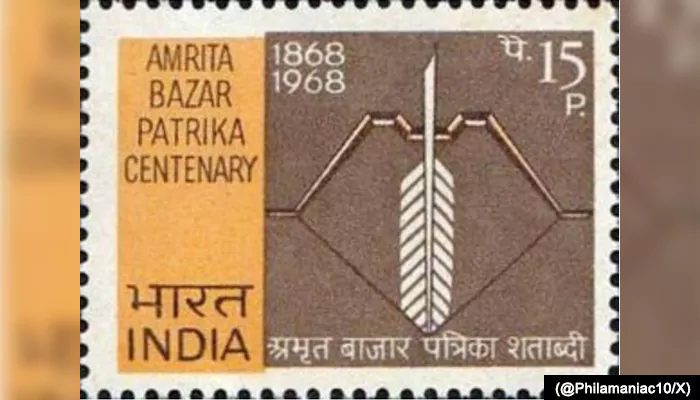
As British rulers slam down harsh censorship on Indian language papers, one bold newspaper pulls off an overnight vanishing act only to reappear speaking perfect English! This is the wild, true story of the Amrita Bazar Patrika and its genius dodge against colonial control.
Alright, let's set the scene. It's 1878. India is firmly under British colonial rule. Our people are stirring, voices of dissent are rising, and newspapers – especially those published in Indian languages (the "vernacular" ones) – are becoming a real thorn in the side of the colonial government. They’re talking about rights, injustice, you name it. The British? Not thrilled.
#Onthisday
— The Partition Museum (@PartitionMuseum) March 13, 2023
The Vernacular Press Act was a significant law enacted in British India in 1878, aimed at restricting the freedom of the Indian-language press. The act was proposed by Lord Lytton, who served as the viceroy of India from 1876 to 1880, pic.twitter.com/4j0IK7KjHP
The Vernacular Press Act
(@PartitionMuseum/X)
So, what do they do? They unleash the Vernacular Press Act. You can regard it as a censorship sledgehammer, and this nasty law gave British officials crazy power:
Overnight, fear spread like wildfire. Papers written in Bengali, Hindi, Urdu – they were suddenly walking on eggshells. Freedom of the press? Poof! Gone. It felt like a massive clampdown, silencing the very voices speaking truth to power. Frustration and anger were boiling over.
Their unwavering commitment to speaking truth to power made them a thorn in the side of the British colonial government. pic.twitter.com/xjcB71Zi3G
— The Partition Museum (@PartitionMuseum) March 13, 2023
Amrita Bazar Patrika in Bangla
(@PartitionMuseum/X)
Now, enter the Amrita Bazar Patrika. Founded way back in 1868 by the amazing Ghosh brothers (Sisir Kumar and Motilal were running the show by 1878), it started as a Bengali weekly in Jessore (now in Bangladesh). It was fiercely nationalist, unafraid to call out British wrongs. Naturally, it was squarely in the crosshairs of this new Act. Shutting down seemed inevitable.
But the Ghosh brothers and their team? They weren't about to go quietly. They hatched a plan so simple, so daring, it was pure genius. The Vernacular Press Act only targeted papers published in Indian languages. English-language papers? They got a free pass (for now). Spot the loophole?
So, under the cover of night, with the Act looming, the Patrika team pulled off a legendary switcheroo. Overnight on April 18-19, 1878, they transformed their entire operation. One day it’s a Bengali paper. The very next issue? Completely in English! They didn't just translate a few articles. They became an English-language newspaper. Just like that.
Following the enactment of the Vernacular Press Act, the renowned newspaper #AmritaBazarPatrika took a bold stance against the oppressive law. The very next day, the publication ceased printing in Indian languages and continued publishing only in English. pic.twitter.com/8zCKa9gOyG
— The Partition Museum (@PartitionMuseum) March 13, 2023
Patrika’s Reply to the Vernacular Press Act
(@PartitionMuseum/X)
Technical Wizardry
Shifting an entire newspaper's language overnight in 1878? No computers, no quick translation apps. It meant having English compositors ready, type set, articles rewritten or translated at lightning speed. Huge logistical feat!
Total Sidestep
By switching to English, the Patrika magically stepped outside the Vernacular Press Act’s reach. The British authorities were left dumbfounded. Their shiny new censorship tool? Useless against this sudden "English" publication.
The Message Was Clear
The Patrika kept publishing its nationalist views, its critiques of the Raj. The content didn't change its tune, only the language did. They were essentially saying, "You want to silence us? Think again. We’ll find a way."
Comrade Lenin's message to Indian people after Jalianwalabagh massacre by British Imperial force's published in Amrita Bazar Patrika. #Lenin150 pic.twitter.com/gw9Gi6aWXU
— AJOY DASGUPTA (@ajoydasgupta) April 22, 2020
(@ajoydasgupta/X)
Defending India, restoring normality, in industrial relations under British colonial rule.
— Ben Rosenzweig (@BenRosenzweig2) May 13, 2024
Article in the 18 September 1946 issue of the Indian newspaper Amrita Bazar Patrika. pic.twitter.com/7MLvrDrb9B
(@BenRosenzweig2/X)
This wasn't just a clever trick to save one newspaper. It was HUGE.
Massive Morale Boost
For Indians chafing under repression, the Patrika’s move was electrifying. It showed that resistance was possible, that colonial laws could be outsmarted. It was a giant middle finger wrapped in perfect English grammar!
Exposing Hypocrisy
It hilariously highlighted the British government's own double standards. Why muzzle Indian languages but leave English alone? It made their bias painfully obvious.
1946 :: Front Page of Amrit Bazar Patrika pic.twitter.com/DWgvTTlInX
— indianhistorypics (@IndiaHistorypic) August 9, 2024
(@IndiaHistorypic/X)
Linguistic Innovation as Weapon
The Patrika proved that language itself could be a powerful tool against oppression. Changing your words wasn't surrender; it could be a brilliant tactical maneuver. This idea echoed throughout the freedom struggle.
Enduring Legacy
The Patrika thrived as an English paper, becoming one of India's most respected national dailies for decades. But its greatest moment? That incredible night in 1878 when it gave the British Raj the ultimate linguistic slip.
From my personal collection. The front page of the LATE MORNING EDITION of Amrita Bazar Patrika on Thursday May 28, 1964.#NehruLegacy #Nehru #newspaper #Archives #history #India pic.twitter.com/PUciEDbAEj
— Suhrid Sankar Chattopadhyay (@suhridsankar) May 27, 2024
(@suridsanker/X)
The Amrita Bazar Patrika’s overnight language switch is one of those glorious chapters in India’s fight for freedom. It wasn't about guns or grand battles; it was about brains. It was about the unshakeable spirit of people determined to be heard, no matter what obstacles were thrown in their path. Faced with a law designed to silence them, they didn't back down. They got creative. They used the rulers' own language against them. Now that's the kind of clever, defiant spirit that helped build a nation.